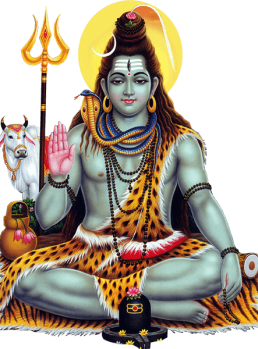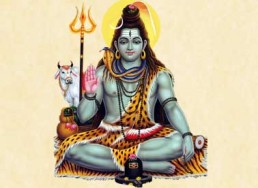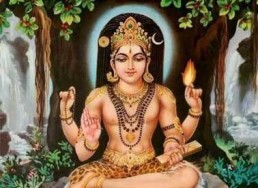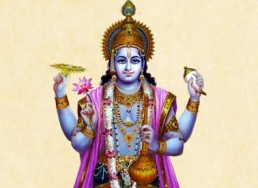Vedasara Shiva Stava
गजेन्द्रस्य कृत्तिं वसानं वरेण्यम् ।
जटाजूटमध्ये स्फुरद्गाङ्गवारिं
महादेवमेकं स्मरामि स्मरारिम् ॥ १ ॥
gajendrasya kṛttiṃ vasānaṃ vareṇyam .
jaṭājūṭamadhye sphuradgāṅgavāriṃ
mahādevamekaṃ smarāmi smarārim .. 1 ..
who wears the hide of the best of elephants, and who is himself the best,
From whose matted hairs is spurting out the holy waters of the great river ganga,
on that mahadeva (with one-pointed mind) I meditate, the one who is the enemy of smara (Kamadeva, representing desires).
विभुं विश्वनाथं विभूत्यङ्गभूषम् ।
विरूपाक्षमिन्द्वर्कवह्नित्रिनेत्रं
सदानन्दमीडे प्रभुं पञ्चवक्त्रम् ॥ २ ॥
vibhuṃ viśvanāthaṃ vibhūtyaṅgabhūṣam .
virūpākṣamindvarkavahnitrinetraṃ
sadānandamīḍe prabhuṃ pañcavaktram .. 2 ..
who is the all-pervading lord of the universe (Vishwanatha) and whose body is adorned with sacred ashes (Vibhuti),
whose unique eyes consists of the triad of the moon (Indu), sun (Arka) and fire (Vahni),
I extol that ever-blissful lord who has five faces (Pancha Vaktra).
गवेन्द्राधिरूढं गुणातीतरूपम् ।
भवं भास्वरं भस्मना भूषिताङ्गं
भवानीकलत्रं भजे पञ्चवक्त्रम् ॥ ३ ॥
gavendrādhirūḍhaṃ guṇātītarūpam .
bhavaṃ bhāsvaraṃ bhasmanā bhūṣitāṅgaṃ
bhavānīkalatraṃ bhaje pañcavaktram .. 3 ..
who is mounted on the king of bulls (Nandi), and whose forms are innumerable,
who is existence itself shining as the underlying consciousness (prakasha) (internally), and whose body is adorned with sacred ashes (externally),
who is the consort of devi Bhavani; I worship that lord with five faces (Pancha Vaktra).
महेशान शूलिञ्जटाजूटधारिन् ।
त्वमेको जगद्व्यापको विश्वरूपः
प्रसीद प्रसीद प्रभो पूर्णरूप ॥ ४ ॥
maheśāna śūliñ jaṭājūṭadhārin .
tvameko jagadvyāpako viśvarūpaḥ
prasīda prasīda prabho pūrṇarūpa .. 4 ..
O the great master (Maheshana) holding the trident (in his hand) and bearing the matted hairs (on his head),
you are the one who pervades the entire universe; and whose form is the universe itself (Vishwarupa),
Be pleased with us, be pleased with us, O lord, whose form is the fullness (of consciousness); (be pleased with us and make us merge in your fullness).
निरीहं निराकारमोंकारवेद्यम् ।
यतो जायते पाल्यते येन विश्वं
तमीशं भजे लीयते यत्र विश्वम् ॥ ५ ॥
nirīhaṃ nirākāram oṃkāravedyam .
yato jāyate pālyate yena viśvaṃ
tamīśaṃ bhaje līyate yatra viśvam .. 5 ..
who is without any desire (attaching him to anything) (Niriha), who is without any form (binding him to anything) (Nirakara), and who is known by meditating on the Omkara,
From whom is created the universe, by whom is sustained the universe,
I worship that lord, in whom finally the whole universe merges.
र्न चाकाशमास्ते न तन्द्रा न निद्रा ।
न चोष्णं न शीतं न देशो न वेषो
न यस्यास्ति मूर्तिस्त्रिमूर्तिं तमीडे ॥ ६ ॥
rna cākāśamāste na tandrā na nidrā .
na coṣṇaṃ na śītaṃ na deśo na veṣo
na yasyāsti mūrtistrimūrtiṃ tamīḍe .. 6 ..
neither by space is his presence limited; similarly neither by lassitude (Tandra), nor by sleep (nidra) (can he be realized),
neither by summer (Grishma), nor by winter (Shita) (is he constrained); similarly neither by place (Desha), nor by attire (Vesha) (can he be restrained),
and nor of whom there is an (exclusive) image (Murti); I extol that trimurti (the cosmic presence behind creation, sustenance and dissolution).
then who is he? the next verse tells about that.
शिवं केवलं भासकं भासकानाम् ।
तुरीयं तमः पारमाद्यन्तहीनं
प्रपद्ये परं पावनं द्वैतहीनम् ॥ ७ ॥
śivaṃ kevalaṃ bhāsakaṃ bhāsakānām .
turīyaṃ tamaḥ pāramādyantahīnaṃ
prapadye paraṃ pāvanaṃ dvaitahīnam .. 7 ..
he is auspicious (Shiva), he is one and only (Kevalam), he is the (internal) manifesting light (of consciousness) (Bhasaka) behind all the (external) manifesting lights (of appearances),
he is Turiya (super-conscious state), beyond all ignorance, and without any beginning and end,
I take refuge in that transcendental purity, who is beyond all dualities.
नमस्ते नमस्ते चिदानन्दमूर्ते ।
नमस्ते नमस्ते तपोयोगगम्य
नमस्ते नमस्ते श्रुतिज्ञानगम्य ॥ ८ ॥
namaste namaste cidānandamūrte .
namaste namaste tapoyogagamya
namaste namaste śrutijñānagamya .. 8 ..
Salutations to you, salutations to you, O the one who is the embodiment of the bliss of consciousness (Cidananda),
Salutations to you, salutations to you, who is attained by Tapas (penance) and Yoga,
Salutations to you, salutations to you, who is attained by the Knowledge of the shrutis (vedas).
महादेव शंभो महेश त्रिनेत्र ।
शिवाकान्त शान्त स्मरारे पुरारे
त्वदन्यो वरेण्यो न मान्यो न गण्यः ॥ ९ ॥
mahādeva śaṃbho maheśa trinetra .
śivākānta śānta smarāre purāre
tvadanyo vareṇyo na mānyo na gaṇyaḥ .. 9 ..
O the great god (mahadeva), O the one who causes happiness to all (shambhu), O the great lord (Mahesha), the one with three eyes (Trinetra),
the beloved of devi Parvati (Shiva Kanta), an embodiment of peace (Shanta), the one who was an enemy of Kama (smarari) and tripura (Purari),
O lord, apart from you there is no Other (for me) to be wished for, venerated and considered (for worship).
गौरीपते पशुपते पशुपाशनाशिन् ।
काशीपते करुणया जगदेतदेक-
स्त्वंहंसि पासि विदधासि महेश्वरोऽसि ॥ १० ॥
gaurīpate paśupate paśupāśanāśin .
kāśīpate karuṇayā jagadetadeka
tvaṃhaṃsi pāsi vidadhāsi maheśvaro’si .. 10 ..
O the consort of Gauri (Gauripati), the lord of all beings (Pashupati) who severe their bondages (Pashupasha nashi),
O the lord of Kashi (Kashipati); By your compassion (and will), this universe, you alone …
destroy, protect and create, O you are the maheshwara (the great god).
त्वय्येव तिष्ठति जगन्मृड विश्वनाथ ।
त्वय्येव गच्छति लयं जगदेतदीश
लिङ्गात्मके हर चराचरविश्वरूपिन् ॥ ११ ॥
tvayyeva tiṣṭhati jaganmṛḍa viśvanātha .
tvayyeva gacchati layaṃ jagadetadīśa
liṅgātmake hara carācaraviśvarūpin .. 11 ..
(and then) in you abides the whole universe (after coming into being), O gracious Vishwanatha,
(finally) in you goes this whole universe during dissolution (laya), O lord of this universe,
you who are of the nature of linga (lingatmaka), you who take away afflictions (hara); you who are of the form of the world with all its moving and non-moving beings (Caracara Vishwarupin); I ever meditate on you.
श्रीगोविन्दभगवत्पूज्यपादशिष्यस्य
श्रीमच्छंकरभगवतः कृतौ
वेदसारशिवस्तोत्रं सम्पूर्णम् ।
śrīgovindabhagavatpūjyapādaśiṣyasya
śrīmacchaṃkarabhagavataḥ kṛtau
vedasāraśivastotraṃ sampūrṇam .

Vedasara Shiva Stava – Introduction
The Vedasara Shiva Stava is a beautiful 10-verse hymn written by Adi Shankaracharya in praise of Lord Shiva. The name “Vedasara” means “essence of the Vedas,” and true to its name, this stotra captures the core teachings of Vedic wisdom in simple, devotional poetry. Shankaracharya presents Shiva as more than just a deity—he reveals Shiva as the Supreme Reality itself, the formless consciousness that exists in and beyond everything. The hymn beautifully explains how Shiva can be both formless (Nirakara) and with form (Sakara) at the same time, existing beyond all qualities while also appearing as the entire universe (Vishwaroopa). This makes the stotra special because it shows us the complete picture of the divine.
What makes the Vedasara Shiva Stava unique is how it combines deep philosophy with sincere devotion. Each verse reveals different aspects of Shiva—as Pashupati (lord of all living beings), as the eternal witness of everything, and as the inner light of consciousness that shines in all of us. The hymn teaches that creation, protection, and destruction are all natural expressions of Shiva’s divine nature. When recited regularly with devotion and understanding, this stotra is believed to bring both worldly peace and spiritual awakening. It serves as both a prayer and a meditation, helping devotees realize their oneness with Shiva. This reflects Shankaracharya’s core teaching that devotion and knowledge are two sides of the same coin, both leading us to the ultimate truth.
Other Shiva Shlokams
Aksharamalika Shiva Stotram
Also called the Shiva Akshara Mala Stotram, this is a very popular prayer addressed to Lord Shiva. Each verse starts in the order of alphabets in Sanskrit.
Anayasena Maranam
O Lord Shiva, please grant me a peaceful death without pain (Anasayena Maranam), a life without any trouble or dependence on others for my basic needs (Vina Dhainyena Jeevanam) and a life filled with
Ardha Narishvara Stotram
Shri Ardhanareeshwara Stotram was composed by Sri Adi Shankara bhagavatpada. Creator and Creation are One ~ Ardhanarishwara, composite of Shiva and Shakti together in one body.
Bhoothanath Ashtakam
The Bhoothanatha Ashtakam composed by Shri Krishnadasa is a devotional hymn that glorifies Lord Shiva in his form as Bhoothanatha, the Lord of all beings, spirits, and the cosmos.
Bilvashtakam
Composed by Sri Adi Shankaracharya, the famous Bilvashtakam extols the virtues of the Bilva leaf (also spelt Vilva, Bilwa) and Lord Shiva’s love for it. The following com
Bilvashtakam 14 Verses
Note: For the original version of Bilvashtakam please click here. Composed by Sri Adi Shankaracharya,
Chandrashekhara Ashtakam
Chandrashekhara Ashtakam is a divine hymn to praise God Shiva as Chandrasekhara, the lord who is adorned with moon on his head (Chandra – moon, Sekhar – crown) and to seek refuge from untimely death.
Dakshinamurthy Stotram
Shlokams,Sankara,Shiva,Dakshinamurthy
The Dakshinamurti Stotra is a Sanskrit religious hymn to Shiva by Sri Adi Shankaracharya. It explains the metaphysics of the universe in the frame of the tradition of Advaita V
Ishvaro Guru Atmeti
Shlokams,Shiva,Dakshinamurthy,Guru,Sankara
Salutations to Lord Dakshinamurti, who is all-pervasive like space but who appears (as though) divided as Lord, Guru, and the Self.
Kalabhairava Ashtakam
Composed by Sri Adi Shankaracharya. The hymn illustrates the personality of Kala Bhairava of Kashi, the God of Death(kala). Those who study these 8 verses on Kala Bhairava, which are enticing and whic
Karacharana Kritam
O Lord, kindly forgive all the wrong acts and omissions I have committed, whether I committed them knowingly or unknowingly, with my hands, feet, words, ears, eyes, or mind. Glory to you, Mahadeva, wh
Karpura Gauram
Pure white like camphor, an incarnation of compassion, the essence of worldly existence, whose garland is the king of serpents, always dwelling inside the lotus of the heart. I bow to Shiva and Shakti together
Kasi Viswanathashtakam
Composed by Sri Adi Sankaracharya in praise of Lord Shiva. That man who reads this octet with its meaning, which sings the praise of Shiva who is the lord of Varanasi, would get knowledge, wealth, gre
Lingashtakam
The Lingashtakam is one of the most popular Ashtakams(a Stotram with 8 verses) dedicated to Lord Shiva which praises Him in the abstract "Lingam" form.
Maha Shivaratri
Significance of Ganesh Puja, Vinayaka Chavithi or Chathurthi. See how to prepare for Ganesha Pooja, How to perform the Puja with Video instructions and enjoy Audio devotional songs, uninterrupted and without ads.
Mantra Pushpam
The Mantra Pushpam (literally translating to "Flower of Mantras") is a collection of sacred verses from the 10th chapter of Taittiriya Aranyaka of Krishna Yajur Veda. Each verse begins with an exploration of the relationship between the flower of…
Margabandhu Stotram
This great Stotra Rathna was written by Appayya Deekshitha(1520-1593). He was one of the great interpreter of Advaitha Sidhantha after Adi Sankara. This stotra is written in praise of the Lord Margaba
Mauna Vyakhya
Shlokams,Sankara,Shiva,Dakshinamurthy
I salute Sri Dakshinamurti, who is not subject to time, who makes known the truth of Brahman through the implied meaning of words, who is surrounded by disciples who are themselves Rishis and committe
Mruthyunjayaya Rudraya
Salutation to you Mrithyunjaya, Rudra, Nilakanta, Shambhu & the lord of immortals and this great lord of all beings.
Namaste astu bhagavan
Morning prayer. From Devi Mahatmyam. The Devi Mahatmyam is a Hindu religious text describing the Goddess as the supreme power and creator of the universe. It is part of the Markandeya Purana, and esti
Nidhaye Sarvavidyanam
Shlokams,Sankara,Shiva,Dakshinamurthy
Salutations to Sri Dakshinamurti, the reservoir of knowledge (the abode of all learning), the healer of all those who suffer from the disease of samsāra, and the teacher of the whole world.
Om Namah Pranavarthaya
Shlokams,Sankara,Shiva,Dakshinamurthy
Om. Salutation to the one who is the meaning of praņava, who is in the form of pure knowledge, who is taintless and who is free from any change. To that Sri Dakshinamurti, (my) salutations.
Om Namo Bhagavate Dakshinamurthaye
Shlokams,Sankara,Shiva,Dakshinamurthy
Om. Salutations to Bhagavan Dakshinamurti. (Oh Lord) Bless me with memory, the capacity to think properly, and clarity, wisdom.
Rudram Chamakam
The Chamakam portion of the Sri Rudram is a profound and structured Vedic prayer that follows the Namakam, extending the worship of Lord Rudra (Shiva) by asking for blessings and the fulfillment of various needs. Unlike the Namakam, which focuses on…
Rudram Chamakam Meaning
The Chamakam portion of the Sri Rudram is a profound and structured Vedic prayer that follows the Namakam, extending the worship of Lord Rudra (Shiva) by asking for blessings and the fulfillment of various needs. Unlike the Namakam, which focuses on…
Rudram Laghunyasam
Laghunyasam is a preliminary Vedic chant traditionally recited before performing the Sri Rudram to purify and align the body, mind, and spirit with divine energy. The term "Nyasam" refers to a process of mentally assigning or dedicating various…
Rudram Laghunyasam Meaning
Laghunyasam is a preliminary Vedic chant traditionally recited before performing the Sri Rudram to purify and align the body, mind, and spirit with divine energy. The term "Nyasam" refers to a process of mentally assigning or dedicating various…
Rudram Namakam
The Namakam portion of the Sri Rudram, also known as the Rudra Prashna, is a profound and intricate Vedic hymn found in the Krishna Yajurveda, specifically within the Taittiriya Samhita (Book 4, Chapter 5). The term Namakam is derived from the…
Rudram Namakam Meaning
The Chamakam portion of the Sri Rudram is a profound and structured Vedic prayer that follows the Namakam, extending the worship of Lord Rudra (Shiva) by asking for blessings and the fulfillment of various needs. Unlike the Namakam, which focuses on…
Rudrashtakam
The famous Rudrashtakam extols the many qualities of Shiva. This is composed by Sri Goswami Tulsidas. Rudra is considered as the fearsome manifestation of Shiva. Rudrashtakam has its origins in the Ra
Shambu Devam Sakalajagatam
I sing in praise of God Shambhu, the Lord of all worlds, and the three-eyed one; the consort of Gauri, the grantor of happiness, blessings and gifts, the one with the moon as his crest-jewel.
Shambu Stuti
A stuti on lord Shiva composed by lord Rama himself. Lord Rama recites this at Rameshwaram when faced with the near impossibility of crossing the vast ocean to reach Lanka, he prayed intensly to Lord
Shiva Aparadha Kshamapana Stotram
The Śiva Aparādha Kṣamāpaṇa Stotram, or "Hymn of Forgiveness for Offenses to Lord Śiva," is a heartfelt composition by the revered philosopher and saint Śrī Ādi Śaṅkarācārya. T
Shiva Ashtakam
Composed by Adi Shankaracharya. This ashtakam is a descriptive salutation of the different attributes of Shiva. The great yogi who is referred to as Ardhanarishwara (the one who has included the femin
Shiva Mahimna Stotram
The Shiva Mahimna Stotra is very popular among the devotees of Lord Shiva and is considered one of the best among all Stotras (or Stutis) offered to Lord Shiva. The legend abou
Shiva Mahimna Stotram Meaning
The Shiva Mahimna Stotra is very popular among the devotees of Lord Shiva and is considered one of the best among all Stotras (or Stutis) offered to Lord Shiva. The legend abou
Shiva Manasa Puja
Sri Adi Shankaracharya composed this mantra for lord Shiva. Using this stotra, we can perform mental worship of Lord Shiva.
Shiva Panchakshara Stotram
The famous Shiva Panchakshara Stotram praises Shiva and the power of the five sacred syllables, na-ma-shi-va-ya.
Shiva Pratah Smaranam
This is a short and beautiful 'Three Shloka Prayer' that makes the start of the day full of energy and happiness. Composed by Sri Adi Shankaracharya.
Shiva Sahasranama Stotram
Also called the Shiva Akshara Mala Stotram, this is a very popular prayer addressed to Lord Shiva. Each verse starts in the order of alphabets in Sanskrit.
Shiva Shadakshara Stotram
In this Hexa-Syllabic Hymn, there is a single stanza mantra for each letter of Aum-Na-Ma-Shi-Va-Ya. This mantra is found in Rudrayamala Tantra text.
Shiva Tandava Stotram
Shiva Tandava Stotram The Shiva Tandava Stotram is a deeply powerful and rhythmic hymn that glorifies Lord Shiva's cosmic dance, known as the Tāṇḍava. It is traditiona
Tatpurushaya Vidmahe Rudra Gayatri Mantra
Om. May we know that Lord Isvara, for which may we meditate upon Mahadeva. May that Rudra impel us (towards him).
Tryambakam Yajamahe
We worship Lord Shiva the three-eyed one, the one who is the master of all senses and qualities and the one who is the sustainer of all growth. May he release us from the bondage of death, just as a r
Vagarthaviva Sampruktau
Kalidasa prays to the divine parents Paarvathi & Parameshwara who are inseparable like the word and its meaning, in order to guide him in acquiring the power of words and their meanings (literature) as he embarks on the Mahakavya, Raghuvamsa.
Vande Shambu Umapatim
I salute Shambu, Umapati, the preceptor (teacher) of devas, I salute the cause of the earth, I salute the one ornamented with the serpent, the wearer of the moon, I respect that master of all beings.
Vedasara Shiva Stava – Shiva – In Sanskrit, English Translation, Meaning, Significance and Audio.



